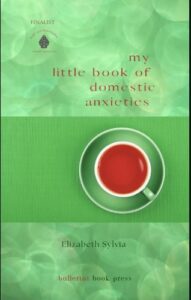 Review by Ruth Hoberman
Review by Ruth Hoberman
Elizabeth’s Sylvia’s new book presents itself modestly: My Little Book of Domestic Anxieties contains only twenty-four poems, and their tone (like the title) is low-key. But such a book isn’t “little” when it’s a forceful, principled embrace of wit, complexity and understatement. In poems that take a range of forms (pantoum, sonnet crown, shaped poems among them) Sylvia strips domestic life of its banality. The experience of being a wife, mother, daughter, beekeeper, and teacher comes across as insistently embodied and strangely unsettling.
Household objects, for one thing, are a little eerie. “I have an excellent view of the banana peel,” Sylvia writes in “Comic Interlude” (7). Indeed. We’re not fully in control of our objects any more than we are of our pasts, the poet suggests. At a mothers’ group gathering, identical puffer coats form a “baffled nylon pile” (3). In “Note for my Husband on the Occasion of my Death,” the speaker, suggesting a posthumous yard sale, warns her hypothetical widower-husband not to “try to oracle some sense/out of the table’s two black legs as they wave off/from a stranger’s open hatch-back car” (6).
The house in these poems is animate, intimate; at times even inside the speaker. In “Yearning,” for example, “the little house/below my lungs/began to shout” (12). I’m reminded that the word “housewife,” taken literally, suggests a marriage between woman and her house. Or, as Anne Sexton writes, “Some women marry houses./It’s another kind of skin; it has a heart,/a mouth, a liver and bowel movements.” Houses and bodies are both haunted by the past, by all they’ve contained. Thus the speaker in “Social Media” remembers the “electricity” of an old love: “It dings me sometimes in the night and I go down the hall/to readjust the blankets on my sleeping child” (8).
That “ding” followed by the speaker’s maternal readjusting of her child’s blanket exemplifies Sylvia’s gift for wry turns at poem’s end. Another example turns up in one of my favorite poems, “The Trouble with a Liberal Arts Degree,” which opens the collection. The speaker remembers a young man who made tons of money at Microsoft without bothering to graduate from high school, much less college. He has a flashy yellow car and a tongue like “an arrow I couldn’t deflect.” With his “motel bedspread” and “brown couch,” he’s successful, but lacks any sense of beauty or empathy. So why the title? Did he lecture the poem’s speaker on the worthlessness of her degree? Probably. Or perhaps the title suggests that there actually is a problem: not that those of us with liberal arts degrees don’t make enough money, but that our education has left us unequipped to counter this kind of aggressive masculinity. “Boys I liked better,/I remember less,” the poem concludes (1). How I admire the concision of that final line, the way so much is left unsaid! The poem’s restraint offers itself as an ethical alternative to the boy’s brash egotism.
So, too, does the sweetness offered by domestic life—in the hummingbird feeder, the beehive, the homemade Christmas tree ornaments, the child reluctant to dunk her head during a swimming lesson. In this comfortably middle-class world, where “our mattress is soft with affluence,” “every disaster here is of our own making” (7). Except for time, maybe, evident in the joy, dismay, and fear with which a parent watches a child grow up, and in the givenness of one’s own historical moment. Sylvia’s book concludes with “December Yoga in New Bedford,” a poem that emphasizes the complex interplay of free will and powerlessness. The speaker in her yoga class realizes she is at once “frozen in time by art and choice” and part of an ongoing process, a “practice” which repeats and reinforces what time and history have done. Her conclusion? “Vigilance to the pose the only solution/I am offered” (36).
Sylvia’s previous book, None but Witches, winner of the 3 Mile Harbor Book Prize in 2021, explored and responded to the minds of Shakespeare’s female characters. Her next book, Scythe, is forthcoming from River River Books (2026). In the meantime, My Little Book of Domestic Anxieties invites us to look closely at the yoga class we’re all in—in which we’re always repeating the same pose, even as (if we’re lucky) we get to start afresh each day.
My Little Book of Domestic Anxieties by Elizabeth Sylvia
Ballerini Book Press, 2024, 36 pp. $14.00 [paper]
ISBN 9783952529089
Ruth Hoberman is a professor emerita of English at Eastern Illinois University. Since her 2015 retirement, her poems and essays have appeared in such journals as Smartish Pace, RHINO, Comstock Review, Michigan Quarterly Review, and Ploughshares.
